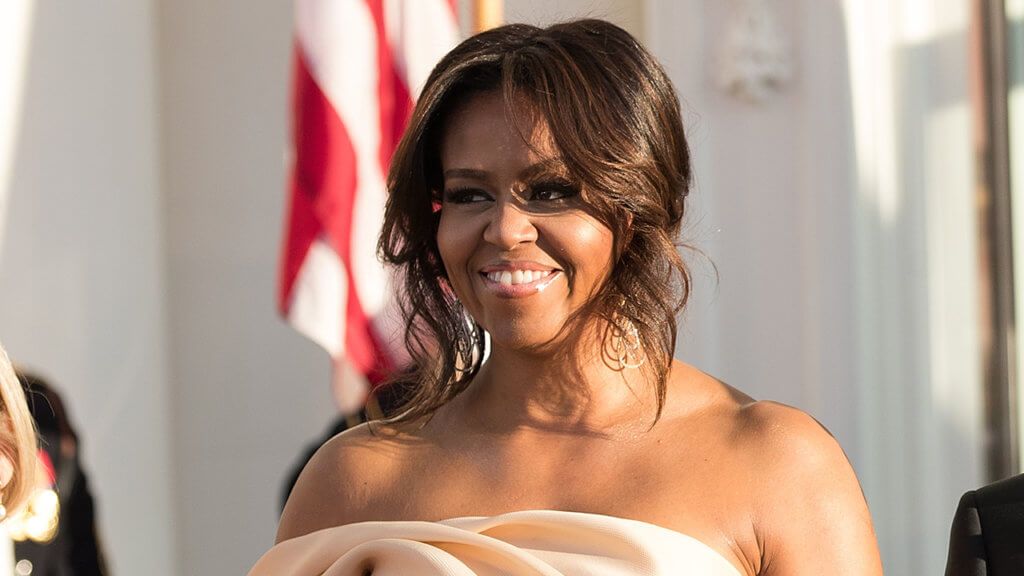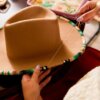No one can argue that America’s First Lady is in a class of her own. She keeps giving us goals and heights to aspire to in all facets of our lives, be it as a mother, daughter, political figure or fashion icon — and she does this in such a relatable, down-to-earth manner.
As her reign as FLOTUS comes to an end, she paused for a moment of reflection as she appeared on the cover of T Magazine’s second annual “The Greats Issue”. Mrs. Obama joined an eclectic and accomplished bunch for the publication’s latest issue. Influential personalities including Lady Gaga, Junya Watanabe, Zadie Smith, William Eggleston, Kerry James Marshall and Massimo Batturo. The issue featured thank-you notes from three famous women, including Nigerian Author and feminist icon, Chimamanda Ngozi Adichie, renowned feminist activist and writer, Gloria Steinem and actress, comic book author and screenwriter Rashida Jones, to Michelle Obama, who has spent the past eight years quietly and confidently changing the course of American history.

By Chimamanda Ngozi Adichie:
She had rhythm, a flow and swerve, hands slicing air, body weight moving from foot to foot, a beautiful rhythm. In anything else but a black American body, it would have been contrived. The three-quarter sleeves of her teal dress announced its appropriateness, as did her matching brooch. But the cut of the dress scorned any “future first lady” stuffiness; it hung easy on her, as effortless as her animation. And a brooch, Old World style accessory, yes, but hers was big and ebulliently shaped and perched center on her chest. Michelle Obama was speaking. It was the 2008 Democratic National Convention. My anxiety rose and swirled, watching and willing her to be as close to perfection as possible, not for me, because I was already a believer, but for the swaths of America that would rather she stumbled.
She first appeared in the public consciousness, all common sense and mordant humor, at ease in her skin. She had the air of a woman who could balance a checkbook, and who knew a good deal when she saw it, and who would tell off whomever needed telling off. She was tall and sure and stylish. She was reluctant to be first lady, and did not hide her reluctance beneath platitudes. She seemed not so much unique as true. She sharpened her husband’s then-hazy form, made him solid, more than just a dream.
But she had to flatten herself to better fit the mold of first lady. At the law firm where they met before love felled them, she had been her husband’s mentor; they seemed to be truly friends, partners, equals in a modern marriage in a new American century. Yet voters and observers, wide strips of America, wanted her to conform and defer, to cleanse her tongue of wit and barb. When she spoke of his bad morning-breath, a quirky and humanizing detail, she was accused of emasculating him.
Because she said what she thought, and because she smiled only when she felt like smiling, and not constantly and vacuously, America’s cheapest caricature was cast on her: the Angry Black Woman. Women, in general, are not permitted anger — but from black American women, there is an added expectation of interminable gratitude, the closer to groveling the better, as though their citizenship is a phenomenon that they cannot take for granted.
“I love this country,” she said to applause. She needed to say it — her salve to the hostility of people who claimed she was unpatriotic because she had dared to suggest that, as an adult, she had not always been proud of her country.
Of course she loved her country. The story of her life as she told it was wholesomely American, drenched in nostalgia: a father who worked shifts and a mother who stayed home, an almost mythic account of self-reliance, of moderation, of working-class contentment. But she is also a descendant of slaves, those full human beings considered human fractions by the American state. And ambivalence should be her birthright. For me, a foreign-raised person who likes America, one of its greatest curiosities is this: that those who have the most reason for dissent are those least allowed dissent.
Michelle Obama was speaking. I felt protective of her because she was speaking to an America often too quick to read a black woman’s confidence as arrogance, her straightforwardness as entitlement.
She was informal, colloquial, her sentences bookended by the word “see,” a conversational fillip that also strangely felt like a mark of authenticity. She seemed genuine. She was genuine. All over America, black women were still, their eyes watching a form of God, because she represented their image writ large in the world.
Her speech was vibrant, a success. But there was, in her eyes and beneath her delivery and in her few small stumbles, a glimpse of something somber. A tight, dark ball of apprehension. As though she feared eight years of holding her breath, of living her life with a stone in her gut.
Eight years later, her blue dress was simpler but not as eager to be appropriate; its sheen, and her edgy hoop earrings, made clear that she was no longer auditioning.
Her daughters were grown. She had shielded them and celebrated them, and they appeared in public always picture perfect, as though their careful grooming was a kind of reproach. She had called herself mom-in-chief, and cloaked in that nonthreatening title, had done what she cared about.
She embraced veterans and military families, and became their listening advocate. She threw open the White House doors to people on the margins of America. She was working class, and she was Princeton, and so she could speak of opportunity as a tangible thing. Her program Reach Higher pushed high schoolers to go further, to want more. She jumped rope with children on the White House grounds as part of her initiative to combat childhood obesity. She grew a vegetable garden and campaigned for healthier food in schools. She reached across borders and cast her light on the education of girls all over the world. She danced on television shows. She hugged more people than any first lady ever has, and she made “first lady” mean a person warmly accessible, a person both normal and inspirational and a person many degrees of cool.
She had become an American style icon. Her dresses and workouts. Her carriage and curves. Toned arms and long slender fingers. Even her favored kitten heels, for women who cannot fathom wearing shoes in the halfway house between flats and high heels, have earned a certain respect because of her. No public figure better embodies that mantra of full female selfhood: Wear what you like.
It was the 2016 Democratic Convention. Michelle Obama was speaking. She said “black boy” and “slaves,” words she would not have said eight years ago because eight years ago any concrete gesturing to blackness would have had real consequences.
She was relaxed, emotional, sentimental. Her uncertainties laid to rest. Her rhythm was subtler, because she no longer needed it as her armor, because she had conquered.
The insults, those barefaced and those adorned as jokes, the acidic scrutiny, the manufactured scandals, the base questioning of legitimacy, the tone of disrespect, so ubiquitous, so casual. She had faced them and sometimes she hurt and sometimes she blinked but throughout she remained herself.
Michelle Obama was speaking. I realized then that she hadn’t been waiting to exhale these past eight years. She had been letting that breath out, in small movements, careful because she had to be, but exhaling still.

By Gloria Steinem:
Michelle Obama came into my life in stages. I knew that, like her husband, she was a Harvard-educated lawyer, but that unlike him, she had grown up on the South Side of Chicago, with parents who had not gone to college. When Barack Obama was a summer associate at her Chicago law firm, they met because she was his mentor. After his successful campaign for the U.S. Senate, I noticed that she chose not to go to Washington. Instead, he commuted to their home and two daughters in Chicago where Michelle had a big job as head of community affairs for a hospital.
But she really entered my imagination once she became first lady, a tall, strong, elegant and seriously smart woman who happened to live in the White House. She managed to convey dignity and humor at the same time, to be a mother of two daughters and insist on regular family dinners, and to take on health issues and a national food industry addicted to unhealthy profits. She did this despite an undertow of bias in this country that subtly questioned everything she did. Was she too strong, physically and intellectually, to be a proper first lady?
After a decade under a public microscope, she has managed what no other first lady — and few people in any public position — have succeeded in doing: She has lived a public life without sacrificing her privacy and authenticity. She made her husband both more human and effective as a president by being his interpreter and defender, but also someone we knew was capable of being his critic. Eventually, she spoke up about the pain of the racist assumptions directed at her, but she waited until her husband could no longer be politically punished for her honesty. And she has always been the best kind of mother, which means insisting that fathers be equal parents. All of this she has done with honesty, humor and, most important, kindness.
Recently, over the course of the Trump-Clinton presidential campaign, Michelle has become one of the most effective public speakers of our time. That’s serious. To be less serious, she has always been a woman who knows the difference between fashion (what outside forces tell you to wear) and style (the way you express a unique self). At one lunch in the White House for women who had been spokespeople and supporters in President Obama’s second campaign, she invited local public school children to sing and perform. Those students, mostly African-American kids, were spirited, talented and at ease in a White House that belongs to them as much as to anyone in this country, yet they wouldn’t have been there without Michelle.
What will she choose to do next? That’s up to her. She could do anything, from becoming a U.S. senator from Illinois to campaigning for the safety and education of girls globally. She could also choose to lead a private life. Whatever she decides, I trust her judgment.
Though I’m old enough to remember Eleanor and Franklin D. Roosevelt in the White House — and all the couples and families since — I have never seen such balance and equal parenting, such love, respect, mutuality and pleasure in each other’s company. We will never have a democracy until we have democratic families and a society without the invented categories of both race and gender. Michelle Obama may have changed history in the most powerful way — by example.
By Rashida Jones:
The first time I met Michelle Obama was at the White House as part of a mentoring initiative, for which the first lady had brought together a dynamic group of women to speak to urban teenage girls about their career goals. Olympians, actresses, producers, writers, an astronaut and an Air Force general gathered in the West Wing to greet Michelle before we headed out to various local schools. She was warm, gracious and charming. She thanked us for coming, hugged everybody and made us all feel like her friends. As first lady, she has ticked all the boxes: loving wife, protective mother, health and fitness advocate, garden enthusiast and, yes, style icon. These accomplishments have left traditionalists feeling satisfied.
But, as is always the way, her reputation as the perfect hostess invited criticism from progressives. Enter Michelle Obama, outspoken activist, a woman who isn’t afraid to remind us she is a proud African-American woman, which is, in itself, revolutionary. A former lawyer who speaks out on behalf of gay rights and gun control, she delivered an unforgettable speech at the Democratic National Convention earlier this year, shining a clear, bright light on our country’s shameful history. Suddenly, the progressives were pleased and the traditionalists were confused. The media wants to pin her down — they’ve been trying since Barack Obama took office in 2009. But you simply can’t.
Michelle Obama embodies the modern, American woman, and I don’t mean that in any platitudinous or vague way. Rarely can someone express their many identities at the same time while seeming authentic. My female friends and I often talk about feeling like we’re “too much.” We’re complicated; we want to be so many things. I want to be a boss and also be vulnerable. I want to be outspoken and respected, but also sexy and beautiful.
All women struggle to reconcile the different people that we are at all times, to merge our conflicting desires, to represent ourselves honestly and feel good about the inherent contradictions. But Michelle manages to do this with poise, regardless of the scrutiny. That, to me, is the best thing for feminism. Her individual choices force us to accept that being a woman isn’t just one thing. Or two things. Or three things. The position of first lady is, unfortunately, symbolic, and that makes it fair game for media analysis ad nauseam. But no think piece can fully encompass a real woman.
If feminism’s goal is equal opportunity and choice, Michelle makes me feel like every choice is available. You can go to Princeton and Harvard, you can rap with Missy Elliott, you can be a mother and a lawyer and a powerful orator. You can champion the Lilly Ledbetter Fair Pay Act, while also caring about fashion. You can dance with Ellen and also fearlessly remind people, on live television, of the reality of your position: “I wake up every morning in a house that was built by slaves. And I watch my daughters, two beautiful, intelligent, black young women, playing with their dogs on the White House lawn.” You can be your husband’s partner and supporter, and also use your cultural and political capital to campaign for Hillary Clinton, unflinchingly standing up to her “locker room talk”-ing bully of an opponent with the battle cry “enough is enough!” — eloquently putting into words what a lot of people, myself included, had been feeling.
Michelle Obama will have her own legacy, separate from her husband’s. And it will be that she was the first first lady to show women that they don’t have to choose. That it’s okay to be everything.
Featured image by Collier Schorr / T Magazine.





